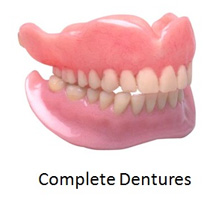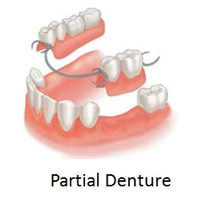You don’t typically plan for the day you will need dentures. In fact, 60% of people surveyed by Prevention.com don’t think they will never need dentures. With proper oral hygiene and dental check ups you can keep your teeth for an entire lifetime. Still, according to a survey by The Centers For Disease Control, 25% of adults 60 years and older have no teeth left at all. Even if you do not lose all of your teeth, most seniors require at least a few prosthetic teeth throughout their lifetime.
Dentures provide a solution for seniors who have lost only a few teeth, or all of their teeth. When dentures are properly fit for your mouth, they offer an affordable solution to restoring the natural look and function of your teeth. At Smilepartnerz we work hard to ensure our NJ patients with dentures are completely satisfied, grinning from ear to ear with the restored confidence of a fully functional smile.
Why Do You Need Dentures?
If you are missing some of your teeth, either in the lower, upper or back portions of your mouth, dentures can provide a cost-effective solution. In total, government statistics estimate over 10 million people living in the US without any upper teeth at all. In other words, it’s not uncommon for tooth loss to occur. Perhaps the most important question to ask is what causes tooth loss in the first place?
Reasons that people experience tooth loss include:
1. Not Enough Dental Visits—The Importance Of Regular Dental Exams
According to a Government Health and Examination Survey, 20% of all adults in America over 65 have no teeth left because of tooth decay or gum disease. When oral bacteria is caught and treated, it will not progress to tooth loss, therefore a leading cause of tooth loss is not visiting the dentist often enough. It’s recommended that you visit the dentist every 6 months for regular check ups. Frequent dental visits won’t allow gum disease or cavities the chance to progress far enough to cause extensive damage that leads to tooth loss. On the contrary, if you let years span between dental visits, bacteria has a chance to cause serious harm. Unfortunately, the same health survey revealed less than half (around 43%) of Americans went to the dentist within the last year. When dental problems first arise they are small and easy to correct, it’s when they progressively get worse that larger issues develop, putting you at risk for needing dentures.
2. Sore, Swollen, Red Gums Leads To Tooth Loss
Around 70% of tooth loss is due to gum disease, a condition that can cause your gums to be red, tender, swollen, or bleed easily. If you notice increased sensitivity in your gums you might be at risk for needing dentures sometime in the near future. Your dentist can identify if you are at risk for gum disease and provide you the proper techniques and treatments to prevent it. Eventually, once gum disease progresses, or goes untreated for many years, tooth loss will unavoidably occur.
3. Loose or Shifting Teeth
If you notice that your teeth feel loose, or seem to be shifting out of place, this might be a sign that dentures are necessarily. The cause of shifting teeth often has to do with bone loss, this occurs when missing teeth or gum disease triggers extra wear on the bone. When teeth and gums don’t properly support your day-to-day mouth functions, your jawbone is required to take on much of the responsibility, although this bone is not made to do so. The negative effects will slowly progress, and you might not notice it is happening until your teeth start to feel weird or appear out of place. Gum disease or bone loss might only impact one area of your mouth, causing only a few teeth to fall out or come loose.
Types Of Dentures
Your dentist will measure your mouth and how your jaw fits together to create the best set of dentures for the particular shape, size, color and bite of your mouth. After you lose a tooth, your mouth begins to change formation in this area. The socket where the tooth once lived fills up with bone and the gums heal over this bone, creating a much different shape than you had before. It takes about 8-12 weeks after your teeth are lost or extracted for this healing process to complete. Conventional dentures are created after this process has taken place. Impressions of your mouth will be taken so that a mold can be created that fits your exact mouth shape and pattern, for a comfortable and secure fit. When dentures fit properly you are able to eat, laugh, talk, and thoroughly enjoy life without worrying about your teeth. You will likely have to return to your dentist for several fittings to get dentures just right.
There are 2 main types of dentures, including:
Complete Dentures
 Made from a plastic base, complete dentures include a full set of porcelain or plastic teeth and gums. Traditionally, these dentures attach by creating a seal at the top line of your gum tissue. For a more secure fit, complete dentures can be attached with a dental implant that is surgically adhered to the jawbone. This type of denture covers your whole jaw and is typically used when all of your teeth are missing, either on the top, bottom, or both portions of your mouth.
Made from a plastic base, complete dentures include a full set of porcelain or plastic teeth and gums. Traditionally, these dentures attach by creating a seal at the top line of your gum tissue. For a more secure fit, complete dentures can be attached with a dental implant that is surgically adhered to the jawbone. This type of denture covers your whole jaw and is typically used when all of your teeth are missing, either on the top, bottom, or both portions of your mouth.
Types of complete dentures can vary. Immediate complete dentures are measured for fit prior to your teeth being extracted, or cleaned up for dentures. This way you can wear them right away. Conventional dentures require more patience, but can provide an overall better fit. Once your teeth have been extracted, cleaned, and prepped for dentures, you will wait a few months for your mouth to completely heal before being measured for conventional dentures. Without teeth, the shape of your mouth will change which is why many wait to have their dentures fit at this point. Some patients prefer immediate dentures as a temporary measure until their conventional dentures are ready.
Partial Dentures
 Partial dentures can be fixed or removable and are used if you still have some of your natural teeth. They are typically made with a plastic base attached to metal framework, which makes it easy to take your dentures in and out, while at the same time keeping them secure. Partial dentures can be made a few different ways, and include a pink gum line to blend in with your mouth as naturally as possible.
Partial dentures can be fixed or removable and are used if you still have some of your natural teeth. They are typically made with a plastic base attached to metal framework, which makes it easy to take your dentures in and out, while at the same time keeping them secure. Partial dentures can be made a few different ways, and include a pink gum line to blend in with your mouth as naturally as possible.
A fixed partial denture (or permanent bridge) is used when more than one or two teeth need to be replaced. This includes inserting crowns onto the teeth on either sides of the gap. In between these crowns artificial teeth are attached so that they sit securely in place. This also helps keep your other teeth in a stable location, otherwise you risk them shifting out of place due to missing neighbor teeth. A precision partial denture is another option that can be removed with internal attachments instead of the standard clips that attach to crowns in your mouth.
To determine what type of dentures are best for you, call Smileartnerz and schedule a consultation today at (973)-694-5101 or fill out the contact form and our staff will get back to you shortly with more information.
What To Expect While Adjusting To Your Dentures
Right away it’s going to seem weird to talk, eat, or even laugh when you are wearing your new dentures. While this is completely normal, you shouldn’t ignore the possibility that your dentures may need to be adjusted to better fit your mouth. Once your dentures fit exactly to your mouth it becomes easier to eat, talk, etc., but it still takes practice to completely adjust.
When it comes to eating, start slow and eat only soft foods at first until it starts to feel more natural. Some people also struggle with talking, noticing their speech is slightly slurred at first. Just practice at home with your loved ones, or even by yourself, we promise that it gets easier in no time. Other problems people experience right after getting dentures includes a gagging feeling, decreased ability to taste foods, and excessive salivating. With time these issues will decrease, talk to your dentist to come up with a solution if one problem is bugging you in particular.
Lower dentures are the most difficult to adjust to for many. This is because upper dentures have more suctioning power which makes them feel more naturally attached. For many, keeping dentures in place at first is a true challenge. Some push their tongue forward against the denture to help secure it in place. With time you will learn how to incorporate your tongue, lips and a great adhesive to hold dentures in place. Dentures should increase your self-confidence, if your dentures are not feeling comfortable or continually coming out of place, you are able to have them adjusted as many times as you need.
How To Care & Maintain Your Dentures
Your dentures are going to require some care on your part. Just like your natural teeth, they are susceptible to build up of plaque and need to be cleaned daily. You want to be careful not to drop your dentures when you wash them, holding them over a folded towel as you clean them is highly recommended.
Tips For Cleaning Your Dentures:
- Brush your dentures and rinse them thoroughly.
- Use a soft-bristled brush and gentle strokes to avoid damaging the outside layer of your dentures.
- As you clean be mindful of all attachments and plastic parts, you don’t want to bend or change the formation of these parts in any way.
- Beware using toothpaste, which is rather harsh for your dentures and can lead to wearing off the top layer.
- Use a denture cleaner to remove stubborn bacteria or build up. Even with ultrasonic cleaners it is still recommended that you brush your dentures daily.
- When you are not wearing your dentures you will need to store them in a moist location, otherwise they will dry out and lose their shape, which is perfectly fit to your mouth. Place dentures in soaking liquid or water, although beware of any metal attachments that your dentures have to prevent tarnishing.
- Never place your dentures in hot water because the heat can cause your dentures to warp out of shape. Remember, heat was used originally to make dentures the right shape and size for your mouth. Additional heat can reverse the process.
Do You Wear Dentures All Of The Time?
When your dentures are new you might want to keep them in at night to more quickly adjust to wearing them. Otherwise you can wear your dentures as often as you’d like, and most patients do not wear them to bed. Full dental implants offer a more permanent solution, but at a less affordable cost. In fear that dentures will continually slip out of place, many assume they need to spend more for dental implants. If your dentures are moving when you laugh or yawn, you might simply need to have your dentures adjusted for a more secure fit, properly fit dentures can be incredibly natural and comfortable.
How Much Do Dentures Cost in NJ?
When properly fit and taken care of, dentures are a long-term investment in your mouth. Since there are a wide variety of options for dentures, the price of dentures varies accordingly in NJ. A set of complete dentures can start as low as $300, and go all the way to $8,000+. Remember, the cost of dentures also includes the careful process of creating the dentures. Plus, in order to prep your mouth for dentures, bone fragments, teeth in need of extracting, and other oral issues might need to be taken care of first.
Does Dental Insurance Cover Dentures For Senior Citizens?
Medicare does not cover dentures, although many dental insurance plans include coverage for dentures. There are very affordable plans that cover dentures, making the choice clearly cost-effective. On average, people with dental insurance can expect to pay anywhere from 20%-50% less out of pocket for dentures. Some dental insurance plans will cover nearly the entire cost. Still, according to the National Center For Health Statistics, only 22% of senior citizens currently have dental insurance. If you don’t currently have dental insurance make sure to check how long you will have to wait to get dentures after enrolling for a plan. Many plans will allow you to get dentures within 6 months of starting your plan. To find out if your dental insurance covers dentures for senior citizens, please call SmilePartnerz at 973-694-5101 to speak to our advisor who can provide you with more details.
Dentures For A Smile You Love
At Smilepartnerz in Wayne, NJ, our dentists have vast experience creating dentures that look, feel, and function like your real teeth. You can restore the natural look of your smile with a set of complete dentures or partial dentures, depending on your specific needs. To determine what type of dentures are best for you, call and schedule a consultation today at (973) 694-5101!

